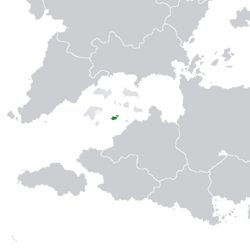Karukera Confederacy: Difference between revisions
mNo edit summary |
mNo edit summary |
||
| Line 51: | Line 51: | ||
|ref_area1 = | |ref_area1 = | ||
}} | }} | ||
The '''Karukera Confederacy'' | The '''Karukera Confederacy'' was a confederation of {{wp|Cacicazgo|chiefdoms}} on the islands of [[Carucere]] in the pre-colonial era. It was formed in 1388 by ''{{Wp|Cacique|Kasike}}'' [[Agüeybaná]] of the Aymanco {{wp|Cacicazgo|chiefdom}}, after he convinced the other ''kasikes'' of Carucere to agree to a set of principles and agreements for oceanic trade. Due to its geographical proximity to [[Cutinsua]] and the massive [[Anne Strait|natural harbor]] between Carucere's main islands, it was a central part of the [[Arucian trade network]] in the pre-colonial era. The Confederacy was not a {{wp|State (polity)|state}} in the traditional sense, but rather a strong network of alliances and agreements established by familial, matrimonial, and ceremonial ties between the chiefdoms. The Confederation grew prosperous from trading with [[Cutinsua]] and other chiefdoms on neighboring islands, bartering goods such as {{wp|pumice}} for precious metals and other luxury goods. The confederacy initially attempted to cooperate with the first Euclean explorers in the 16th century, but after the destruction of [[Cutinsua]], it was heavily weakened. The confederacy was destroyed in 1533 by an military expedition commanded by Captain James Edwards of Estmere, who established the [[Colony of St John]] on the island. The influence of the Confederacy in Carucere remains significant to this day. | ||
Revision as of 15:43, 28 August 2022
Islands of Beautiful Waters Karukera | |||||||||
|---|---|---|---|---|---|---|---|---|---|
| 1388–1533 | |||||||||
|
Symbol of the Confederacy | |||||||||
 Location of Carucere | |||||||||
| Capital | None | ||||||||
| Official languages | Nati language | ||||||||
| Common languages | Runanca | ||||||||
| Religion | Nati religion | ||||||||
| Government | Confederacy | ||||||||
| History | |||||||||
• Formation of the Confederacy | 1388 | ||||||||
| 1528 | |||||||||
• Conquest by Estmere | 1533 | ||||||||
| Area | |||||||||
| 1527 | 8,165.51 km2 (3,152.72 sq mi) | ||||||||
| |||||||||
The 'Karukera Confederacy was a confederation of chiefdoms on the islands of Carucere in the pre-colonial era. It was formed in 1388 by Kasike Agüeybaná of the Aymanco chiefdom, after he convinced the other kasikes of Carucere to agree to a set of principles and agreements for oceanic trade. Due to its geographical proximity to Cutinsua and the massive natural harbor between Carucere's main islands, it was a central part of the Arucian trade network in the pre-colonial era. The Confederacy was not a state in the traditional sense, but rather a strong network of alliances and agreements established by familial, matrimonial, and ceremonial ties between the chiefdoms. The Confederation grew prosperous from trading with Cutinsua and other chiefdoms on neighboring islands, bartering goods such as pumice for precious metals and other luxury goods. The confederacy initially attempted to cooperate with the first Euclean explorers in the 16th century, but after the destruction of Cutinsua, it was heavily weakened. The confederacy was destroyed in 1533 by an military expedition commanded by Captain James Edwards of Estmere, who established the Colony of St John on the island. The influence of the Confederacy in Carucere remains significant to this day.